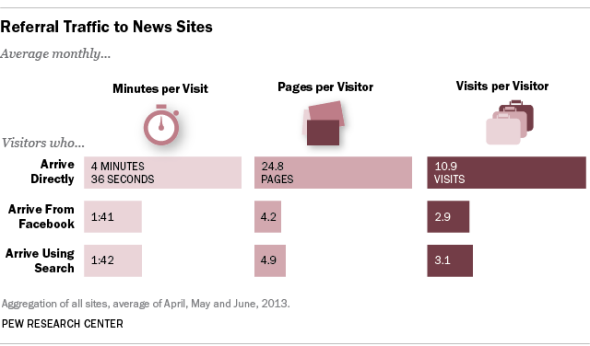Chances are a few of your favorite news sites survive largely by the grace of Facebook. Mark Zuckerberg’s profitable little panopticon is almost certainly responsible for an inordinate chunk of their traffic. And publishers love to tell advertisers about their social stats because they supposedly show that readers care enough about their articles to share them. That’s why, when a site such as Upworthy perfects a stylistic gimmick that’s effective at convincing Facebook users to click on a headline, imitators suddenly pop up everywhere.
But here’s the problem with Facebook users: While they might dominate the attention economy, they have very short attention spans.
Recently, the Pew Research Center looked into how different consumers behaved on news sites depending on whether they’d arrived at them directly by typing the URL into their browser, through search, or through Facebook. The report analyzed comScore data on 26 of the top destinations for online news, including the New York Times, BuzzFeed, Breitbart, CNN, Fox News, and the Huffington Post. When visitors showed up directly, Pew found, they tended to linger a bit, and were likely to come back—averaging 10.9 visits per month at 4:36 minutes per visit. Facebook users, on the other hand, popped in, then bailed out. They average 2.9 visits per month at 1:41 minutes per visit.

In other words, for news sites, Facebook users are the exciting one-night stands the ad sales team can brag about. Readers who show up via the homepage are more like the boring but dependable spouse.
This is all pretty much in keeping with what Pew has told us before about Facebook users. Namely, that they’re not really current events junkies (or if they are, Facebook isn’t where most go for a fix). Only 16 percent say they use the site primarily to get news, and 47 percent say they don’t even want news stories mixed in their feed along with the baby photos and personality quizzes. For the most part, Facebook is a comfy online space where people go to check on friends and be lightly entertained, possibly while reflecting upon the sweet mysteries of life in listicle form. They graze for content, and if they chomp down on some news, it’s probably by accident.
Facebook itself is seemingly trying to change those reading habits. In August, the company tweaked its newsfeed algorithm in order to present users with more “high-quality content”—a move that sent a surge of new traffic to all sorts of publishers. Theoretically (I repeat, theoretically) its engineers could try to tweak the formula further, in order to surface stories that its users will both click and spend time on.
In the meantime, what does the fickle nature of the typical Facebooker mean for news organizations? Pew argues that for a site like BuzzFeed, which tries to generate gonzo traffic numbers in order to appeal to advertisers, courting hordes of Facebook users is a great business strategy. For sites like the New York Times that want to build a paying audience, it makes far less sense.
But part of me wonders whether Facebook traffic could soon lose a bit of its currency on the advertising front as well. Even Upworthy says it plans to stop measuring success solely in unique eyeballs and will focus instead on the number of minutes users pay attention to its content. If advertisers start buying into that metric, your typical Facebook reader might suddenly look far less valuable, since attention is the thing they lack most.
